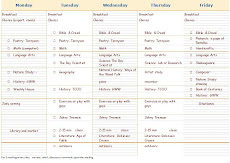Here's another site.
(I don't know if Kieron actually has the underlying condition, but he certainly has the symptoms. We have worked on this through the years but it seems to be hitting particularly hard this year, partly I suppose since the gap between the cognitive and the mechanical is widening).
Some strategies listed:
1. Encourage students to outline their thoughts. It is important to get the main ideas down on paper without having to struggle with the details of spelling, punctuation, etc
2. Have students draw a picture of a thought for each paragraph.
3. Have students dictate their ideas into a tape recorder and then listen and write them down later.
4. Have them practice keyboarding skills. It may be difficult at first, but after they have learned the pattern of the keys, typing will be faster and clearer than handwriting.
5. Have a computer available for them to organize information and check spelling. Even if their keyboarding skills aren't great, a computer can help with the details.
6. Have them continue practicing handwriting. There will be times throughout a student's life that they will need to be able to write things down and maybe even share their handwriting with others. It will continue to improve as long as the student keeps working at it.
7. Encourage student to talk aloud as they write. This may provide valuable auditory feedback.
8. Allow more time for written tasks including note-taking, copying, and tests.
9. Outline the particular demands of the course assignments/continuous assessment; exams, computer literacy etc. so that likely problems can be foreseen.
10. Give and allow students to begin projects or assignments early.
I'm going to try a few of those and see how they work for him. Then I will move on to some more (there were a LOT listed).
Before I looked it up, I was thinking that I would have him do some review work every day in writing. I noticed that when the math is easy, for example, he has a lot less trouble writing (less reversals, less shaky writing, less dawdling and chewing his pencil) than when its at his level of challenge.
So I was thinking that I ought to simply switch to doing most of his work orally, then have him either:
- Do a bit of written work at an easier level (from last year's math or from earlier in this year)
- Copy out a "fair copy" of the work I've written down for him.
- Have him do math copywork.
I can do the same with spelling... use the earlier spelling words for handwriting remediation, then work with him on the more difficult words.
Same with the progym. As far as the progym goes, the dysgraphia sites say it is important to be allowed to outline and order thoughts at your level of ability rather than your level of mechanical competence. Of course, I can't STOP Kieron from ordering his thoughts all the time, whether I'm teaching this skill or not. But CM/classical methods like narration and the progym will allow easily for this.
Also, on the occupational therapy front -- the crafts will help. Fortunately, he loves crafts.
And I am going to try to have a "warm up" period before we sit down to work, where he does some of the Brain Gym type exercises.
So that is the plan for this week.



No comments:
Post a Comment